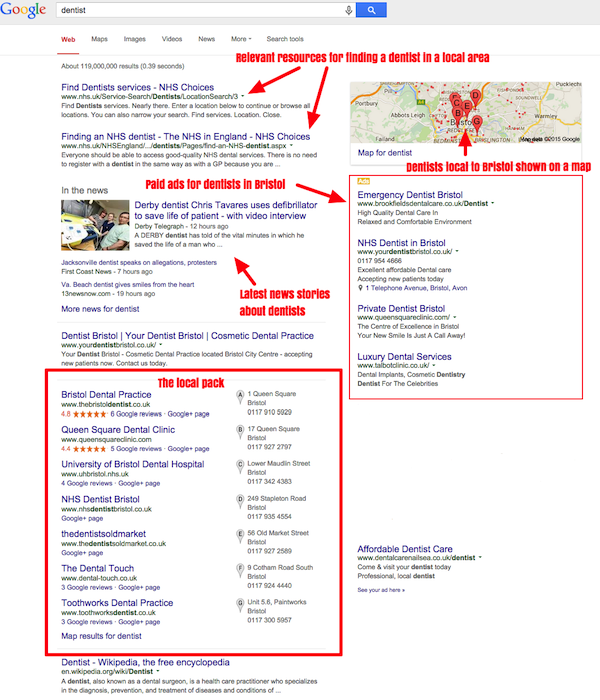As a local business you should be engaging with your local community and potential customers everyday, both online and offline. When it comes to online, local search has the potential to expose you to new customers and facilitate your business growth. This potential has increased recently with Google making major steps to improve local search for users by introducing an algorithm called Pigeon to change the way it responds to local searches. There is no better or more important time to give local search the attention it deserves. This guide looks at just how you can ensure your local business thrives online.
Local Search and Pigeon
What You Need To Know…
What is Local Search?
Local search refers to how search engines, and we refer to Google specifically in this article, use an algorithm to return results based on the geographic location of the user. These results are different to those returned in other organic searches.
When you make a local search enquiry, Google returns results based on your location (using your IP address from desktop and location tracking on mobile devices) and the intent behind your enquiry. Even if you don’t include a location/place like Bristol in your search, Google still takes your geographic location into account when returning results. For example, if you are in Stokes Croft in Bristol and only search for ‘bar’ it will return bars and pubs local to the Stokes Croft area of Bristol.
What is the Pigeon Algorithm?
On July 24 2014 Google pushed out a new local search algorithm in the United States – it was nicknamed Pigeon. It was then rolled out in the UK, Europe and Australia in December 2014.
History of Pigeon Algorithm Timeline
- July 24th 2014 – Pigeon rolled out in USA
- December 22nd 2014 – Pigeon rolled out to UK, Canada and Australia
Here’s how the industry authorities summarised the update:
Barry Schwartz in Search Engine Land described the Pigeon update:
“Google has released a new algorithm to provide more useful, relevant and accurate local search results that are tied more closely to traditional web search ranking signals.”
Whereas MOZ updated their Algorithm Change Report with the following:
“Google shook the local SEO world with an update that dramatically altered some local results and modified how they handle and interpret location cues. Google claimed that Pigeon created closer ties between the local algorithm and core algorithm(s).”
As with the introduction of any new algorithm, there is a period of fluctuation, where we see considerable changes to the local search results as the algorithm is tweaked and improved. You may have noticed your own rankings moving up or down slightly following the update.
Even now, several months since the original roll out, it is still hard to pinpoint exactly what the Pigeon algorithm means for local business owners. We have looked into our own clients and followed the industry commentary closely to share with you items of interest, conjecture and theories as to the true nature of Pigeon and what you can do to fall in line with it.
In short, the update was designed to make the results of local search queries even more relevant and accurate to users. Here are some top line points about Pigeon based on what we know so far:
- It is the biggest local search update that Google has ever released
- “Distance and location ranking parameters are improved”
- It connects web search and map search in a more cohesive way.
But what you really want to know is what the impact of these changes will be. So far, we believe that it will provide:
- Greater weight for high-quality local directories – Yelp and other local directories have been boosted ahead of Google’s own results and are therefore more relevant
- Less results showing in packs – 3 from 7 packs showing in SERPs
This is what a local search for ‘dentists’ looks like (for now):

Defining Local Areas in Pigeon
The algorithm saw Google improve their distance and location ranking parameters. This has resulted in them reducing the radius of any local search or getting ‘hyperlocal’. By reducing the search radius, Google hope to return even more relevant results to the user. It is believed that with Pigeon, Google have also attempted to understand better both smaller areas of a city but also how people might refer to them colloquially.
For example, rather than returning results for an area defined as say South Bristol, Google could well now split it out into Southville and Bedminster. Also, by changing the distance calculations, Google may well recommend similar places in neighbouring areas. So if you search for a Cotham coffee shop, it may return coffee shops in Redland.
One of the reported side-effects of this hyper-localisation in the States is that those locations based on the outskirts or just outside of a city have been negatively impacted.
What does Pigeon mean for someone using Google search?
Anyone using Google Web Search for localised search terms like ‘Bristol hotel’ or simply ‘hotel’ will have noticed a change in the search engine results pages (SERPs). The point where you carry out your search (even more relevant on Mobile) will strongly affect these SERPs, in relation to the proximity of address of the businesses it returns. Pigeon’s focus on localisation has affected the entire front page for many search results.
Pigeon has also changed the number of Packs showing in SERPs for some local search categories. Packs, in the main, have been reduced from seven packs to three packs. Users will notice this in the SERPs.
There’s also been a change with the 10 businesses listed within Google Maps search.
What does Pigeon mean for the business owner?
Google now returns less local organic results on the first page of SERPs following Pigeon. This has resulted in more competition for these rankings. Since the Pigeon update, your business may have experienced fluctuation in search rankings for various terms and this may have had an impact on your traffic. If some of your target keywords have fallen off, it could well have had a significant impact on your site’s organic traffic.
As well as focusing on delivering excellent service that exceeds that of your competitors in your local area, you should also ensure that your SEO or online marketing agency are doing all they can to optimise your site for Pigeon. By doing this, you stand a better chance of appearing for relevant searches in relevant areas from relevant people. Online localisation is key to a business’s online success. If done correctly, you should appear in the Google Local Pack results as well as local site listings and review sites, maximizing your chance to receive relevant traffic.
How do I rank locally?
If you are a local business owner or your client is a local business or has local branches then they will want to rank locally. Following Pigeon, chances are they will be asking ‘How do I rank locally?’ or ‘How do I improve my local rankings?’ As previously mentioned, there are no certainties when it comes to optimising for a new algorithm but what we can do is offer pointers.
Before discussing how to optimise for Pigeon, it’s important to talk more generally about how to make Google happy and rank well. It goes without saying that you want your website to be as fast, user-friendly, mobile-friendly and full of useful and relevant content and information as possible. This will always be the biggest influencer on your rankings.
Beyond this though there are some steps to take to help your site rank locally. Your website needs to provide more signals to Google as to your locality to highlight your relevance to local users. Google now relies more than ever on contextual clues that it will consider ranking factors:
Pigeon Ranking Factors
The Web CEO guide nicely summarises the local ranking factors used by Google as follows:
- Proximity of user’s IP location to a business’s physical address.
- Proximity of the business address to a city centre.
- HTML NAP (name, address, phone number) information match with Google Plus Local NAP information.
- Consistency, Quality and Quantity of Citations (listing information on local directories )
- Domain Authority.
- Number and Quality of Links.
- Number of Reviews.
- Social Signals.
In order for your site to rank locally, you can carry out onsite changes as well as complete other online activities to help achieve this:
Onsite Optimisation
Content
Content is hugely important, especially when it comes to Pigeon. Your site will need plenty of unique, location-specific content that visitors will find interesting and valuable. In doing this, you will find that your site receives more high quality links locally, including through citation. If you can become newsworthy and an authority in your local area by producing high quality content then Google will reward this in local search.
Keywords – Pigeon will give greater weight to local businesses that have keywords and citations in their local area. When looking for content opportunities complete keyword research in your local area (use AdWords Keyword Planner) You can then get a better idea of those terms with higher local searches and less competition. You may also discover long tail local searches that could be worth pursuing in a blog post on your site.
Homepage
It is important that your homepage contains useful and informative content for users. It should include information on who you are, where you are located and what services you provide.
Sitewide
It is recommended to reference your city and local area across your site to help Google understand the location of your business. This is especially on local landing pages. You can do this by using location terms in:
- Homepage (or local landing page) Title Tags – town/city in Title Tag
- Most/All Other Website Title Tags – town/city in Title Tag
- In the copy of the local landing page
- H2/H3 tags – town/city in Homepage (or local landing page) H1/H2 Tags
- Alt Tags – town/city in alt tags where relevant
- URLs – Include geographic Keyword in Website URL
Site architecture
Ensure any pages on your site that are local pages are crawlable and well-optimised at every level. Your website needs to be structured in a way that allows PageRank (link juice) to flow down to all of your location pages. You can help by using internal linking to point to relevant local pages.
Off-Site Optimisation
Google Business / Google +
If you haven’t done so already, you will need to claim your business page on Google My Business. When completing your Google Business profile, provide as much detail as possible as to what you do and where you are located. As with anywhere that your business NAP appears online, ensure that the details match exactly those that appear on your website.
If you previously used Google Places for Business or the Google+ Dashboard to manage your business information, your account will have been automatically upgraded to Google My Business. Updating business using Google My Business updates the information across Google Search, Maps and Google+.
Local Packs
One of the most notable and noticeable results of Pigeon was the decline in local packs. There are now more three packs and less seven packs featuring in the SERPs. Check to see how many are showing up for your target keywords. If it has shrunk to three and you do not appear then you need to work on building greater organic authority.
Hyperlocal
Optimise your business’s social profiles and Google Business profile to reflect your specific location within the city. It’s no longer enough to just feature the name of that city or region. For example, Loom is a Bristol-based online marketing agency but we are based in Stokes Croft, central Bristol. This hyperlocal element is more important, especially with mobile search, following Pigeon’s tightening of the radius of local search.
But I have multiple business locations from one website?
If you have more than one business address, then you will need a landing page for each location that you will then need to optimise on an individual basis with local terms. Support this with blog content specific to each locations such as the 10 Best Bars in Stokes Croft.
Google Maps
Find all examples of your business address online and make sure they are all the same and in the same NAP format NAME/ADDRESS/PHONE NO. If Google maps is picking up the wrong address for your business then this process is essential. You can even embed a Google Map onto your local Contact Us pages.
Directories
Directories are a tricky business. Mired by the murky days of SEO, they have been pretty much and rightfully ignored in recent years, but they are now increasingly important in local search. Pigeon has placed emphasis on local business directories for more searches now. Therefore maintaining consistent local listings is vital.
Firstly you should identify any incorrect listing information that already exists online and correct. Then you will want to list your business on trustworthy local directories in order to build local citations. Yelp, Yell, FourSquare and TripAdvisor are some of the most significant in this post-Pigeon landscape. Be sure to maintain accurate and complete listings here, preferably accompanied by good reviews.
You should also identify the directories that are ranking well around your keyword terms and make sure you are listed with them.
When it comes to populating your directory profile ensure that you are submitting your business to the most relevant category and providing as much relevant information as possible. Avoid taking any of the descriptions from the copy on your own website.
Reviews
There is some limited evidence to suggest that reviews on directories and on Google Business are a ranking factor. You can encourage your customers to write honest reviews on your Google Business page as well as on local directory sites.
WikiData
Google’s Knowledge graph for your business was once pulled in part from Freebase but is now being pulled from WikiData. Jimmy’s recent article gives you more context but put simply you need to update your WikiData business page with all of your correct local listing information.
Schema Markup for Local Business
Local Business Schema is a way of providing Google with relevant information about your business. You will need your web developer to populate the information in the required format and upload it onto your website as outlined on the Local Business Schema page. Once implemented you should use the structured data tool on Webmaster Tools to check that it is fully readable.
Local Linkbuilding
Google Pigeon relies more on local links as a ranking factor so it’s worth focusing on building relationships with people in your local area both online and offline. Make yourself known to local websites and bloggers who write about your local community. By creating fantastic relevant local content and developing meaningful relationships you should earn links within your local area. You can also carry out a competitor audit using AHREFs or a similar tool to see if there are any relevant local sites to form a relationship with or directories.
Digital Marketing from Loom
Loom love to work with ambitious local businesses to help them reach the people that matter in new and innovative ways. We offer local SEO to businesses who want to be found in their local area. If you want to find out more about how we can empower you online then give us a call today on 0117 923 2021.
Further Reading
https://moz.com/blog/mastering-serving-the-user-as-centroid
https://searchengineland.com/everything-need-know-pigeon-algorithm-211771





